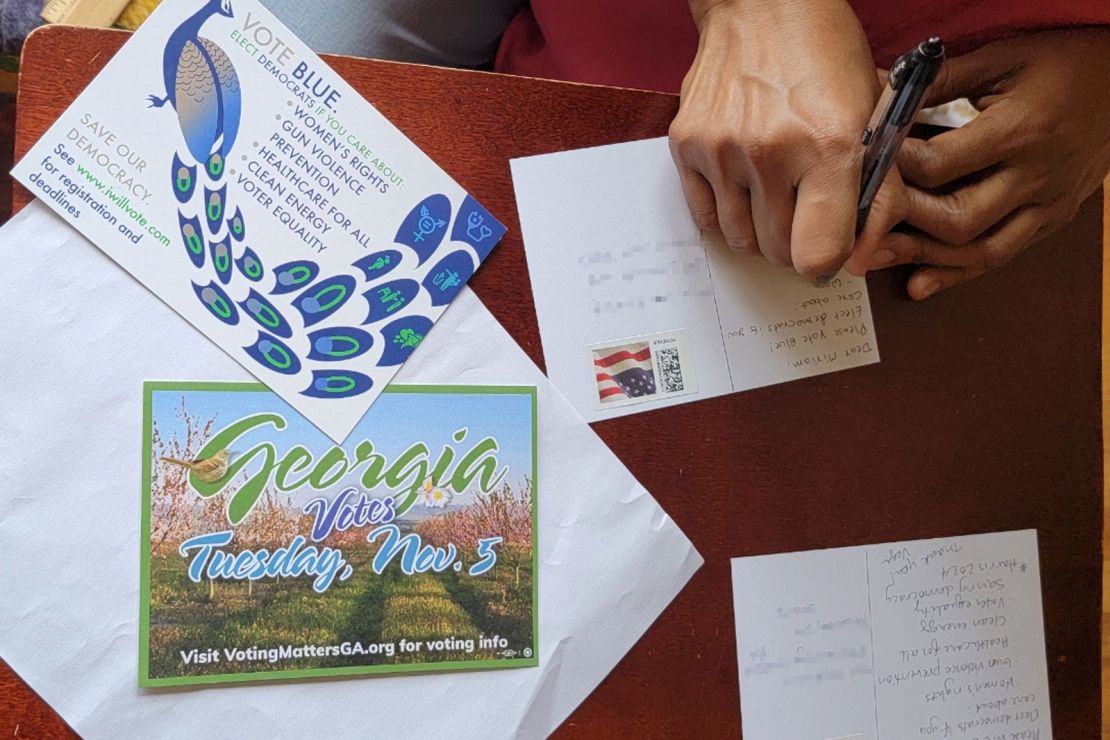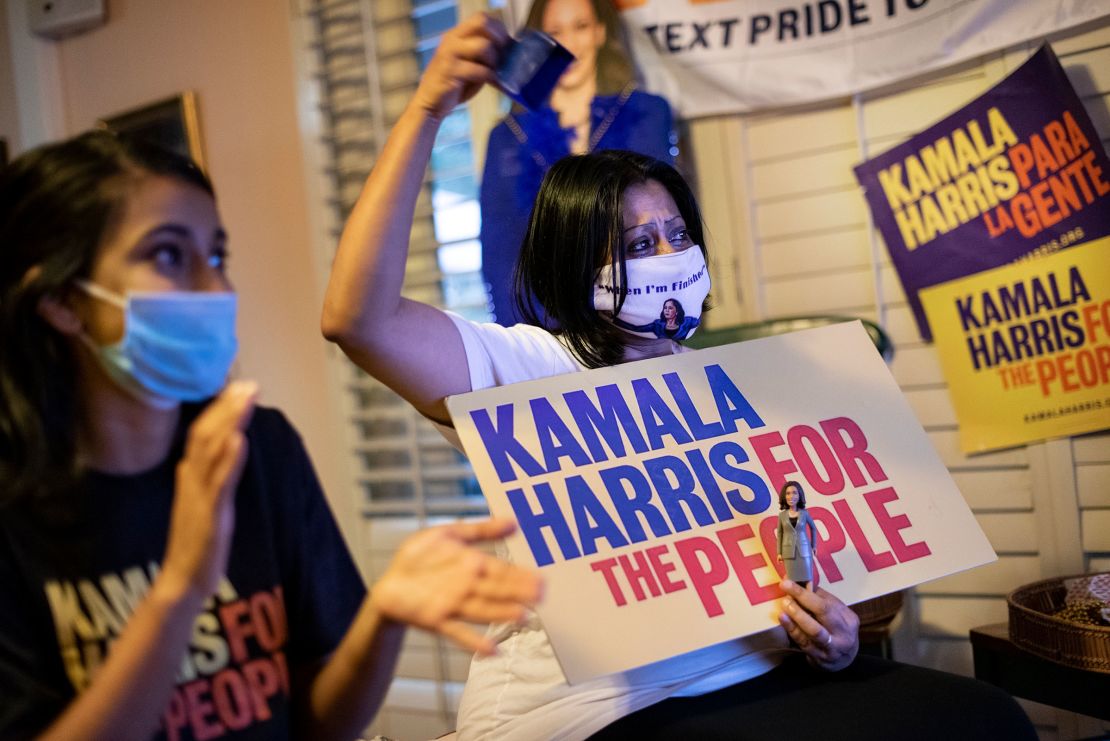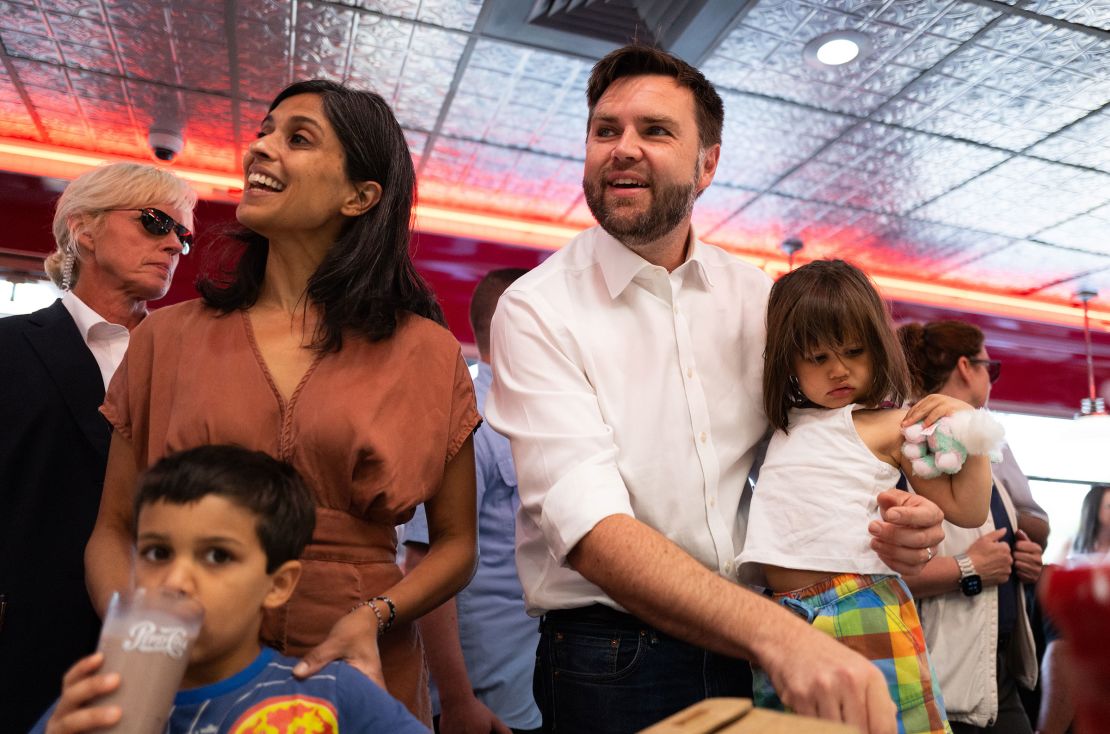On a recent Sunday afternoon, Vineeta Gupta hosted 20 Indian American women at her home in Silver Spring, Maryland. Fueled by chana masala, naan and rice pudding, they wrote hundreds of postcards in an appeal to fellow South Asians.
Their message: Vote Kamala Harris for the next president of the United States.
Organizing for a political candidate was a highly unusual move for Gupta, a 61-year-old physician and human rights lawyer who immigrated to the US from India in 2003. Despite advocating various social justice causes, Gupta — a registered independent — had never involved herself in electoral politics outside of voting.
That changed last month when Harris, the daughter of Indian and Jamaican immigrants, rose to the top of the Democratic ticket after President Joe Biden announced he wouldn’t seek reelection.
Gupta joined several WhatsApp groups of politically activated South Asian Americans. She participated in a “South Asian Women for Harris” Zoom call. She appealed to skeptical women of color on LinkedIn. On August 6, she drove to Philadelphia to watch Harris introduce Minnesota Gov. Tim Walz as her running mate — Gupta’s first election rally.
“It became impossible not to engage,” she told CNN. “The choice is not about Democrats or Republicans. The choice is between democracy and losing it.”
Many Indian Americans appear to share Gupta’s newfound enthusiasm and urgency. Over the past several weeks, national and grassroots political organizers from the community say they’ve seen a groundswell of support and energy for the Harris campaign. Aunties and uncles are exchanging “LOTUS for POTUS” memes in WhatsApp group chats (Kamala means lotus in Sanskrit). The Indian American Impact Fund said the South Asian women Zoom call that Gupta joined raised more than $275,000, and leaders from the advocacy group report an influx of small-dollar donations and volunteer sign-ups.
Indian Americans haven’t historically been a political force in US elections, but the 2024 race could mark a turning point for one of the fastest growing immigrant groups in the country. With the Indian American population more than doubling in key battleground states between 2010 and 2020, some organizers say a fired-up electorate could make a difference come November.
An estimated 4.8 million people in the US identify as Indian Americans – a relatively small slice of the US electorate – and more than 2.1 million of them are eligible voters, according to the research and policy organization AAPI Data.
Indian Americans tend to be a reliably Democratic voting bloc with high turnout rates: 55% of Indian American voters identified as Democrats or leaned Democratic, and 91% said they plan to vote in November, an AAPI Data survey conducted before Biden’s departure from the race found.
But while nearly half of Indian American voters (46%) indicated in the survey that they would vote for Biden, the figure was down nearly 20 points from 2020 (65%).
And many Indian Americans, like Gupta, weren’t engaged beyond the ballot box — until Harris catapulted to the top of the ticket.

Her ascension also reinvigorated the volunteers of the “Chitthi Brigade,” a grassroots group of South Asian women that gets its name from a Tamil term for aunt. New York state resident Indira Rajan, who co-founded the group in 2020 after Harris’ vice presidential nomination, said volunteers felt a sense of hopelessness around Biden that has since given way to a “sea change in motivation” and new sign-ups. She and her fellow “chitthis” across the country now plan to engage in letter-writing initiatives and meet-and-greets, as well as to collaborate with other local organizations on events.
At least part of the Indian American enthusiasm for Harris stems from pride in a shared identity.
Harris’ late mother, Shyamala Gopalan, was born in the Indian state of Tamil Nadu and immigrated to the US in 1958 to attend a doctoral program at the University of California, Berkeley. Harris has shared childhood memories of visiting her grandfather in Chennai and has spoken about how her Indian heritage has influenced her life and career.
“She comes from Besant Nagar in Chennai. That’s where I grew up,” Rajan said. “It seems something very close to home.”
“There’s more of a comfort level with her, partially because her mom looks like my mom,” said Viraj Mehta from Bethesda, Maryland. The 38-year-old physician said he was inspired to connect with the Indian American Impact Fund and join several organizing groups after Harris entered the presidential race.
Though Indian Americans have risen to political prominence in recent years, the prospect of an Indian American occupying the nation’s highest office has especially energized organizers and volunteers, says Indian American Impact Fund Executive Director Chintan Patel.
“It’s easy to imagine, moving forward, that parents are going to be telling their kids, ‘You should be a doctor. You should be an engineer. You should also be a president,’” he said. “It’s really helping reimagine for the South Asian American community what is possible here in America for our kids.”
As powerful as that representation is, for most Indian Americans, it’s simply one consideration.
Though some, including Mehta, supported Harris during her first presidential bid in 2020, Gupta and others have come on board because they see a more mature and savvy candidate now.
“When she went into the race this time, there was something authentic about her,” Gupta said. “I identify with that myself, as a South Asian woman – how much implicit and explicit pressure we keep on our shoulders not to be our authentic selves.”
While Harris’ Indian background can help turn out the vote and galvanize more volunteers, it won’t matter much in terms of how people vote, said Karthick Ramakrishnan, founder and executive director of AAPI Data and a researcher at UC Berkeley.
Like US voters more broadly, many Indian American voters surveyed by AAPI Data identified the economy as their top policy concern – Indian American enthusiasm for Biden decreased from 2020 in part because voters said they disapproved of his economic performance, Ramakrishnan said.
Still, there are some nuances to how this demographic votes, with Indian Americans particularly concerned about immigration and climate change, according to Milan Vaishnav, a senior fellow and director of the South Asia program at the Carnegie Endowment for International Peace.

Ratna Rao, a grassroots political organizer in Michigan, said the Biden administration’s policies around illegal border crossing and asylum seekers were frustrating to those Indian Americans who endured long waits for green cards due to massive processing backlogs.
“People feel like Democrats are more focused on people who are coming here illegally than the legal immigrants who have been working hard, paying taxes and being a part of the community,” she said.
More than half of Indian Americans surveyed by AAPI Data also indicated that they could not vote for a candidate with opposing views on abortion. Gupta, who formerly practiced as a maternal health physician in India, said Republican-led attacks on reproductive rights are a key reason why she’s mobilizing for Harris.
“After (Roe v. Wade) went to dust, I cannot imagine that we are going to restrict it even more,” Gupta said. “That is not acceptable for me as a woman, as a women’s health physician, as a mother.”

Despite the overall enthusiasm, the support for Harris isn’t a given in some parts of the Indian American community.
Ramakrishnan said Biden’s handling of Israel’s war in Gaza lost him support among some Indian Americans who wanted to see more US support for Palestinians.
Rasheed Ahmed, executive director of the Indian American Muslim Council, said he and others in his circles are waiting to see how Harris will navigate the US relationship with India, considering the current Indian government’s policies and rhetoric toward Muslims and other minorities.
“We want to see Vice President Harris taking some kind of position on the fundamental rights of minorities in India,” he said. “Most of us are waiting for that before we make the final call.”
Whatever frustrations some Indian Americans may have with the Democratic Party, the GOP has not been able to capitalize on them and recruit more of the community into its fold.
Just over 1 in 4 Indian American voters (26%) identify as Republican or lean Republican (compared with 21 % in 2020), according to AAPI Data. While the data indicates a slight dip in Indian American voters who identify as or lean Democratic, that decrease hasn’t necessarily translated into more support for the GOP, Ramakrishnan said – even as Indian Americans have become prominent in the party.
Former South Carolina Gov. Nikki Haley and Ohio entrepreneur Vivek Ramaswamy, two Indian Americans who sought the Republican presidential nomination this year, were both not viewed favorably by a majority of Indian Americans, Ramakrishnan said, citing past AAPI Data findings.
“(Indian Americans are) more likely to favor the Democratic Party because they see the Democratic Party as stronger on combating discrimination by race,” he said. “After the 9/11 attacks, especially with the rise in hate crimes and discrimination and racial profiling of Indians, that gap between the Democratic and Republican Party and its credibility and that issue grew even wider.”
The 9/11 attacks revealed to Lakshmy Parameswaran that her fundamental rights weren’t as secure as she once believed, prompting her entry into political organizing more than two decades ago. Now, she feels her rights and the country’s democratic institutions are similarly under threat.
“This is really a very anxiety-provoking time in this country,” said Parameswaran, a grassroots organizer in Houston. “I’ve been here since 1973 – I’ve never felt this kind of anxiety. It’s been growing since 2016 onwards, and now it’s at a point where this can all be taken away.”
The foothold gained by Christian nationalism in GOP politics has also contributed to the party’s struggles to reach Indian Americans, Ramakrishnan said.
“Another factor, which has gotten stronger over time … is the rise of Christian conservatism and now Christian nationalism within the Republican Party,” he said. “Indian Americans are majority Hindu, and religiously very diverse, and so that makes it difficult for Indian Americans to feel at home in the Republican Party.”

The selection of JD Vance as Donald Trump’s running mate excited Indian American conservatives – Vance’s wife, Usha, is the daughter of Indian immigrants, and people close to the former president expressed hope that she could appeal to minority voters. But her time in the spotlight has been brief so far – less than a week after her husband joined Trump’s ticket, Harris stepped in for Biden and grabbed the headlines.
As is the case with most US voters, party identification is what ultimately matters, according to Ramakrishnan.
Once Indian Americans identify and affiliate with one party – and a majority are fairly stable Democratic supporters of the Democrats – they’re unlikely to cross party lines just because of a shared ethnicity, he said.
Energized by the fervor around the Harris campaign, Indian American grassroots organizers are getting more strategic about how they reach voters in their communities.
Rao, the Michigan organizer, said she and fellow organizers are experimenting with friend-to-friend outreach in WhatsApp groups. In an attempt to appeal to parents, one tactic involves distributing short videos of young South Asians talking about how gun violence and other issues affect them.
“We may be able to penetrate a little bit more of the people who don’t normally answer calls, open doors, or read a postcard that comes to them – better if they see a video that’s sent by a friend,” she said.
Jayashree Bhaskar and her husband KS Bhaskar, who live in Chester County, Pennsylvania, organize phone banks on weekend afternoons for speakers of regional Indian languages such as Gujarati and Punjabi. The initiative has been so well received that Bhaskar said volunteers are asking for more language options, such as Tamil and Malayalam.
Other efforts from the Bhaskars include door-knocking, text banking and dropping literature and voter registrations at temples in Bucks County.
Though they recognize that they’re working with a small portion of the overall population, the Bhaskars say they’ve done the math: There are enough South Asian registered Democratic voters in Pennsylvania to help Harris win the key battleground state if they can turn them out.
“Elections are won on the margin, and we can be the margin of victory,” Jayashree Bhaskar said. “It’s as simple as that.”














